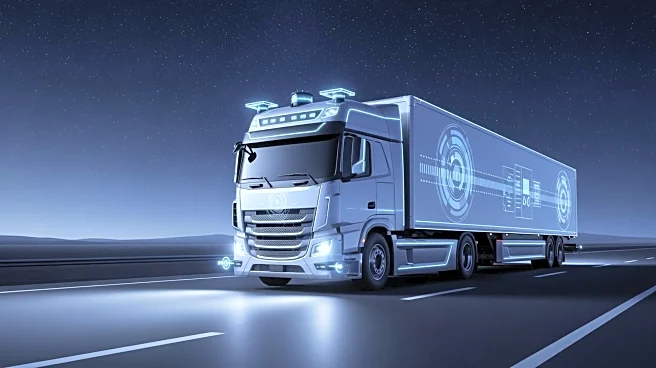What's Happening?
Waabi, a company specializing in autonomous vehicle technology, has partnered with Volvo Autonomous Solutions to develop and deploy autonomous transportation solutions. This collaboration has led to the integration of Waabi's virtual driver system into
the Volvo VNL Autonomous truck. The focus is now on broad commercial deployment, with Waabi's technology capable of operating driverless trucks on surface streets in Texas, with plans to expand nationwide. The autonomous system is designed to be safe, scalable, and efficient, addressing key challenges in the transport industry such as safety, efficiency, and capacity. The technology is adaptable to multiple truck platforms and features plug-and-play hardware that is lightweight and aerodynamic, contributing to fuel savings.
Why It's Important?
The advancement of autonomous trucking technology has significant implications for the U.S. transportation industry. By potentially increasing safety and efficiency, autonomous trucks could transform freight logistics, reducing costs and environmental impact. However, the rapid deployment of such technology raises concerns about road safety and the displacement of truck drivers. The Owner-Operator Independent Drivers Association (OOIDA) has expressed the need for mandatory testing and safety requirements to ensure the reliability of autonomous vehicles. The shift towards autonomy could disrupt the trucking workforce, impacting the economy and necessitating new regulatory frameworks to manage these changes.
What's Next?
As Waabi and Volvo continue to expand their autonomous trucking operations, the industry will likely see increased adoption of such technologies. This could lead to further regulatory scrutiny and the development of new safety standards. Stakeholders, including government agencies and industry groups, may need to collaborate to address the potential economic and social impacts of driverless trucks. The expansion of autonomous trucking could also prompt other companies to accelerate their own autonomous vehicle initiatives, potentially leading to a more competitive and innovative market.
Beyond the Headlines
The move towards autonomous trucking could have broader implications beyond logistics and transportation. It may influence urban planning and infrastructure development, as cities adapt to accommodate driverless vehicles. Additionally, the environmental benefits of more efficient freight transport could contribute to sustainability goals. However, ethical considerations regarding job displacement and the safety of autonomous systems will need to be addressed to ensure a balanced approach to technological advancement.















